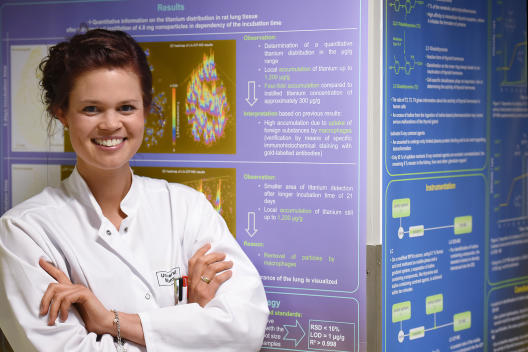15 Minutes for Junior Researchers

31 speakers will be presenting the results of their research during the International CiM Symposium, with one expert after another taking the stage. One of the speakers – scarcely known to the scientific community – is Mandy Großgarten, who is a doctoral student in Chemistry in the research group led by Prof. Uwe Karst at the Institute of Inorganic and Analytical Chemistry at Münster University. She is one of eight junior researchers who are being given the opportunity to address the audience alongside all the famous names.
The CiM Symposium programme is a diverse one. Reflecting the interdisciplinary nature of the Excellence Cluster, the speakers will be representing a variety of disciplines. Also, scientists will be speaking who are at various stages on the career ladder. Leaders of CiM research groups were able to recommend doctoral and post-doctoral students to give talks during the international conference. Uwe Karst had put forward the name of his doctoral student Mandy Großgarten, and she was chosen.
So Mandy Großgarten will be stepping up to the microphone for 15 minutes at the CiM Symposium. She will not have much time to talk about her scientific work, which is why every single minute is valuable for her. “Speaking time is important at a symposium,” she says. “I’m grateful for every minute that’s reserved for my results.” She is already preparing intensively for her talk, which she has already given to her PhD supervisor Uwe Karst and to the entire research group. With them she has polished the talk and prepared herself to answer any questions that may be asked. After all, there is one special challenge at the CiM Symposium: in the audience there will be scientists from a variety of disciplines. “That’s why my talk should be interesting and easy-to-follow – clearly comprehensible for everyone,” says Großgarten.

The subject of her research fits well into the CiM Symposium’s concept. Analytical Chemistry is a subject that is very much characterized by interdisciplinary work, with scientists developing methods for Pathology, Biomedicine or Pharmacy. Mandy Großgarten, for example, is working on tissue samples taken from the lung, developing methods of visualization which show the distribution of foreign substances such as nano-particles in the tissue. She is also working on the visualization of cleansing mechanisms with which the body frees tissue of such foreign substances. “Using gold-labelled antibodies,” she says, “we can clearly see nowadays which processes occur in the body.”
She has already been working on her doctoral thesis for a year and half now. This is an excellent time to get some feedback from the scientific community, and it is something she is looking forward to. She can not only present her latest research results in her talk, she can also use the breaks between the talks to exchange ideas with other scientists. “Anything that gets me thinking, every discussion, even every question that I can’t answer – it’s all of great value for my scientific work,” says Großgarten. “I still have 18 months to put new ideas into practice,” she adds.
This will not be the first talk that Großgarten has given to an audience outside her Institute. She has already presented her work at the Anakon Conference in Graz, for example, as well as at the ICP-MS Users Meeting at the Helmholtz Centre in Geesthacht and at the Analytical Atomic Spectroscopy Colloquium at the Helmholtz Centre for Climate Research in Leipzig. Her PhD supervisor Uwe Karst encourages his students to give such talks outside the Institute. It is the only way for them to get used to presenting the subject of their research, he says. “They have a long-term benefit from the experience,” he adds. “It’s important to be able to make clear, understandable statements in any exchange with scientists from other disciplines – but just as important when junior researchers later apply for jobs in the academic world or in industry.”
Karst is already looking forward to the different talks to be held during the CiM Symposium and will be interested to see which of them surprises him in what it has to say. “Because of the broad range of topics being dealt with, the Symposium is not seen as the core event for any one discipline,” he explains. But this, he says, is precisely what makes it so attractive. “A range of different disciplines come together, and participants discover connections for long-term collaboration.” He says that he has already had good experience with interdisciplinary events and likes going to the CiM’s annual Flexible Funds Symposium, for example, where scientists from the researchers’ network and from a variety of disciplines apply for funding. Karst passes this wide range of interests on to his junior researchers – including Mandy Großgarten, whose interests are just as varied and who has a high regard for collaboration with researchers from other disciplines.

